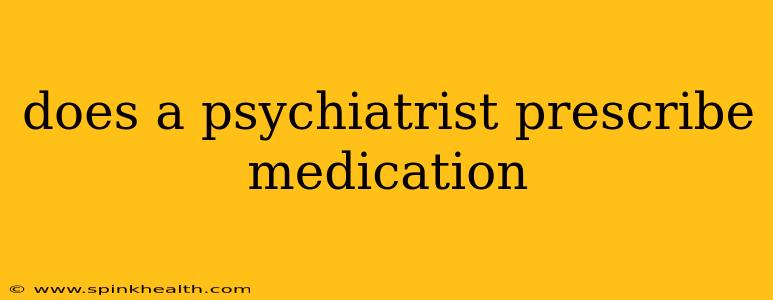Does a Psychiatrist Prescribe Medication? The Short Answer: Yes, But It's More Than Just Pills
The short answer is a resounding yes. Psychiatrists are medical doctors (MDs or DOs) who specialize in the diagnosis, treatment, and prevention of mental illnesses. A core component of their treatment plans often involves prescribing medication. But that's only part of the story. Let's delve deeper into the world of psychiatric care and medication management.
Imagine Sarah, a young woman struggling with crippling anxiety. She's tried various coping mechanisms, but nothing seems to alleviate the overwhelming fear and constant worry that plague her daily life. After a referral from her primary care physician, Sarah meets with Dr. Ramirez, a psychiatrist.
Dr. Ramirez doesn't just jump straight to medication. He starts by conducting a thorough assessment, listening attentively to Sarah's experiences, asking detailed questions about her symptoms, family history, and lifestyle. He also orders various tests to rule out any underlying medical conditions that might be contributing to her anxiety. This careful process is crucial – because the right treatment depends on a correct diagnosis.
What other treatments might a psychiatrist offer besides medication?
This leads us to an important point, often overlooked in the question of medication. While medication is a significant tool in a psychiatrist's arsenal, it's rarely the sole treatment. Dr. Ramirez might suggest a combination of approaches, including:
-
Psychotherapy: This involves talking therapies, such as Cognitive Behavioral Therapy (CBT) or Dialectical Behavior Therapy (DBT), to help Sarah understand and manage her anxiety. These therapies aim to equip her with practical tools to cope with her symptoms and change negative thought patterns.
-
Lifestyle Changes: Dr. Ramirez might recommend lifestyle adjustments like regular exercise, a balanced diet, sufficient sleep, stress management techniques (like mindfulness or yoga), and limiting caffeine and alcohol. These seemingly simple changes can significantly impact mental well-being.
-
Referral to other specialists: Depending on Sarah's situation, Dr. Ramirez might refer her to other healthcare professionals, such as a therapist, social worker, or addiction specialist. A holistic approach is frequently the most effective.
What types of medications might a psychiatrist prescribe?
The type of medication prescribed depends heavily on the specific diagnosis. For anxiety, it could include selective serotonin reuptake inhibitors (SSRIs) or other antidepressants. Other mental health conditions might necessitate different medications, such as antipsychotics, mood stabilizers, or stimulants.
Does a psychiatrist always prescribe medication?
No. While medication is a common part of psychiatric treatment, it's not always necessary or appropriate. For some individuals, psychotherapy and lifestyle changes might be sufficient. The decision is made collaboratively between the psychiatrist and the patient, taking into account the severity of the symptoms, the individual's preferences, and potential side effects of the medication.
What is the role of a therapist versus a psychiatrist?
This is a frequently asked question, and the distinction is important. Psychiatrists are medical doctors who can diagnose and treat mental illnesses, often using medication. Therapists (like clinical social workers, psychologists, or counselors) typically focus on psychotherapy and don't prescribe medication. They work closely with psychiatrists as part of a comprehensive treatment plan.
In Sarah's case, the combination of medication, CBT therapy, and lifestyle adjustments proved highly effective. Her anxiety significantly decreased, allowing her to lead a more fulfilling life. This highlights the multifaceted nature of psychiatric care; medication is a crucial tool, but it's part of a larger, patient-centered approach to healing.

